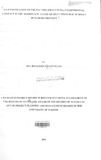| dc.description.abstract | We spend at least one-third of our adult lives in the workplace and in very close proximity with all sorts of people. The effects of conflict in the workplace are therefore widespread and costly to the institution and to the individuals in it. This study therefore aims at investigating the factors influencing interpersonal conflict in the workplace. The study identified three objectives namely: investigating the influence of communication on interpersonal conflict, establishing how competition for limited resources contributes to interpersonal conflict in the workplace and establishing the effect of task interdependence on interpersonal conflict. Extensive literature review was carried out to provide background information to the study.
It included review on sources of conflict in the workplace, conflict management styles and effects of conflict in the workplace. Methods of data collection have also been discussed; the study was carried out through the survey method targeting secondary school teachers in Nairobi Province, the schools were stratified into 9 districts and thereafter a school was randomly selected from each district. Data was be collected using structured questionnaires with both open-ended and closed-ended questions which were be administered to the respondents through the drop and pick method.
Data analysis was then carried out through the use of the Statistical Package for Social Scientists (SPSS); this included descriptive analysis, frequency presentation and interpretation of data. Data was analysed in the form of descriptive statistics and presented in descriptive Statistics and presented in simple tables and percentages. 'The findings of the study, indicated that creating proper channels of communication was very important as poor communication was a major source of conflict. Limited resources were also noted to escalate conflict while independence of tasks was unavoidable but necessary for achievement of organizational goals.
In conclusion it was noted that conflict is sometimes useful as it can bring about desired positive changes to an institution. It was recommended that the stakeholders in secondary schools should set up structures to improve communication, encourage equitable sharing of resources and train teachers on conflict resolution mechanisms. | en_US |

